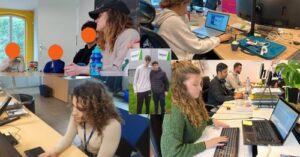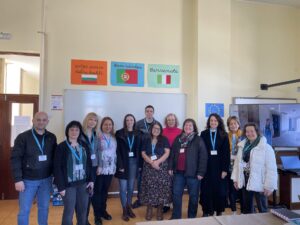The MOOC on “VET Mobility Management” started on 16 th November and it was very well received by the Portuguese teachers and staff involved in European projects.
This online course had the goal of guiding the participants through the entire process of a project of international mobility. It was structured in units with short texts, videos and interactive activities that allowed the participants to acquire and develop knowledge and also to start to build a project idea. Additionally, the participants of this MOOC were able to exchange ideas, views and experiences on questions from the application process of a mobility project to its implementation and evaluation.
The Portuguese participants were very interested in the MOOC contents and were very open in sharing their questions and experiences. Some of the participants mentioned their inexperience with the Erasmus+ programme, and the MOOC was their first contact with the available information on VET European mobility, grants, applications and project implementation.
Many participants made very clear what an Erasmus experience can bring to the school, students and teachers/staff. For instance, a teacher shared that “I believe that European mobility is already beginning to be part of our daily lives, conquering education and allowing a greater connection among Portuguese and European teachers. Through European mobility, teachers benefit immediately from the exchanges and progress of scientific and technological knowledge. In this sense, the benefits are many and our students are winners from this sharing of experiences, responding more effectively to their needs and contributing to a positive change in society.” Another comment from another teacher mentioned that “My connection to European programs started with Erasmus (mobility between universities in 2002), to which I created an emotional bond. I saw, in first hand, the great benefits that this type of programme can bring to its participants.
The participation in such experience is an indelible milestone in my life. In retrospect, I can recognize a profound personal and professional impact that this initiative has had on me. This growth and transformation gave me the tools to build a more diverse personal and professional path, more competent, more autonomous, more culturally aware and with a worldview that would not have been possible otherwise.”
It was also mentioned the importance of these experiences for students with fewer opportunities. One teacher from the north of Portugal says: “The region of Felgueiras, where I teach, is a region characterized by work in the footwear industry and also in agriculture, especially with the production of wine and kiwi. Most our VET students come from families where the economic resources available are essential for their survival, so they do not have the opportunity to travel or access culture. By participating in European projects, the students can have access to other cultures, customs, languages and working methods. The knowledge and skills acquired are an important part for their development as people and professionals. By becoming more autonomous, they bring added value to their communities, since they become more entrepreneurial workers, confident in their performance.”
It is clear that schools with experience in implementing mobility projects are very aware of the benefits of these experiences and the magnitude of its impact on the personal and professional lives of all of those involved. It is a general feeling that it is very important to integrate, develop and implement such programmes so that this part of the educational system, often forgotten, neglected and even stigmatised, can have access to these opportunities.





